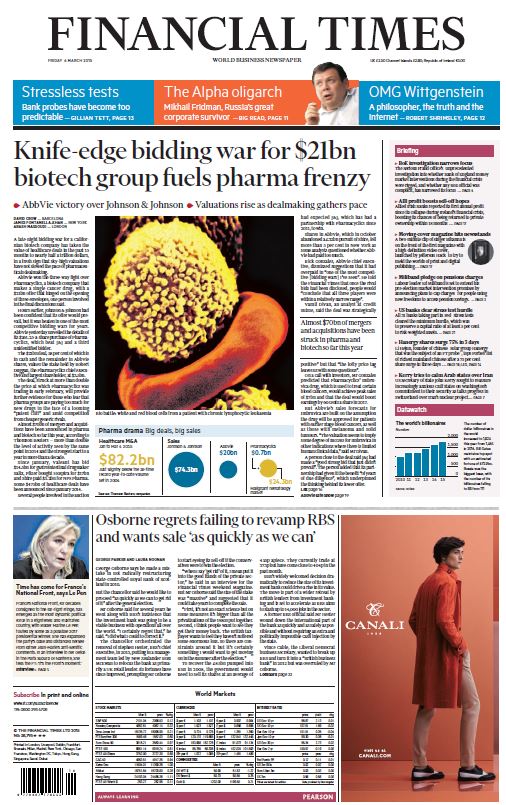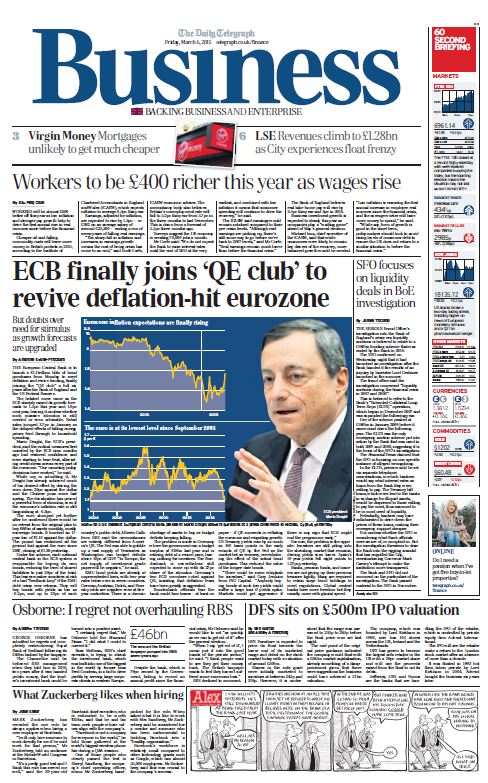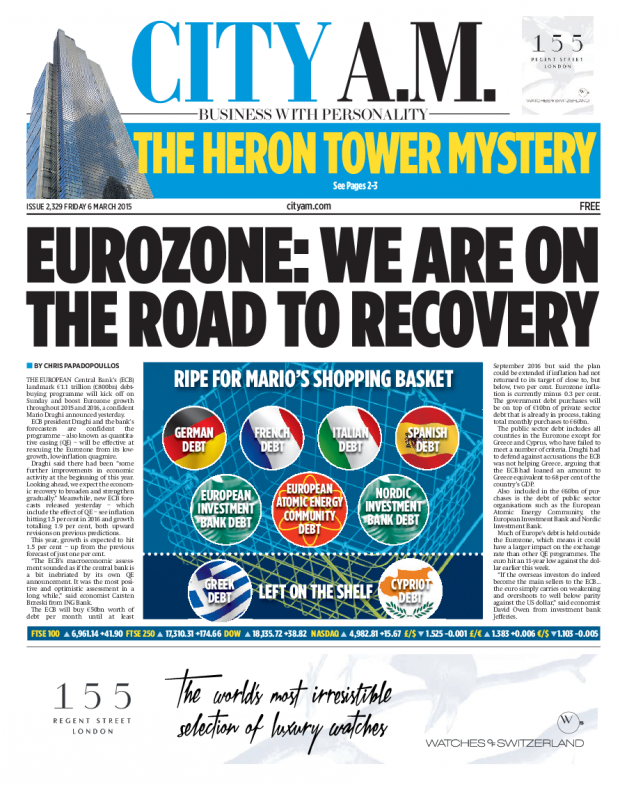| Problems viewing this? Click to view in your browser |

Morning Edition |

|
|
Good morning. How is the world’s largest economy faring? Will the Fed raise rates sooner, rather than later? The closely watched non-farm payroll data, published at 1.30pm GMT, could well give economists a better idea. Or at least a more informed guess. The number of jobs created last month is forecast to have fallen to 240,000, according to economists polled by Reuters, down from 257,000 in January. But the focus will be on wage growth, which has been largely stagnant during the recovery. Last month’s data showed a 2.2 per cent annual increase in wages, the strongest 12-month gain since August 2014. While this was historically low, it does suggest some tightening in the labour market. Another strong(ish) number could be crucial in the Fed’s plans to start raising interest rates. “It’s increasingly difficult to imagine the Fed raising rates in June if wages aren’t seen to be improving,” says Luke Bartholomew of Aberdeen Asset Management. For the latest on the jobs data - and the market reaction - log on to our Business Now live blog and don't forget to follow me on Twitter for updates throughout the day - @fletcherr. Fosun International, the Chinese conglomerate that bought Club Med last month, has announced this morning that it has invested £91.8 million in return for a 5 per cent stake in Thomas Cook Group. The pair have drawn up plans for a “strategic partnership”. More shortly on www.thetimes.co.uk/business. Let's hope this is one DFS sale that ends. The sofa retailer has confirmed that it is to float near the bottom of the range. The group is expected to have a market value of around £540 million when trading begins - so much for that £1 billion valuation put on the retailer by its hopeful private equity owners. Finally, an apology. In yesterday’s email I wrote that it was seven years since the Monetary Policy Committee had cut rates - it is of course six years. Thanks to those of you who pointed out my error. Richard Fletcher |
|
|
|
|
The Federal Reserve said all 31 big US banks subjected to a stress test have sufficient capital to absorb losses during a prolonged economic downturn. It’s the first time since the central bank started stress tests in 2009 that no bank fell below any of the main capital thresholds. The annual examinations are the cornerstone of the Fed’s efforts to prevent a repeat of the 2008 financial crisis and to gauge the ability of banks to withstand economic turmoil. |
|
|

|
|
|
|
|
The Treasury is preparing to freeze defence spending after the election, Whitehall sources warned last night, fuelling a growing Tory rebellion over Britain’s military budget. More than 30 MPs are to stage a Commons showdown next week in an attempt to force David Cameron to meet a Nato commitment to spend at least 2 per cent of national income on defence. “Everyone everywhere seems to be acting like The Wolf of Wall Street's Jordan Belfort. But is there a case to be made for wilfully choosing to earn less money at the height of your career? It turns out that although there is lots of advice out there on how to demand and secure a pay rise, not much has been written about the art of self-impoverishment. However, if you look hard enough you will find revealing examples.” Sathnam Sanghera on pay. Kevin Love, Lidl’s new executive consultant chef, may have the requisite background as a top cook, having won a Michelin star running the kitchen at Heston Blumenthal’s Hinds Head pub in Bray, Berkshire. However, he has one additional entry on his CV that makes him uniquely well qualified for the role — he is a former Lidl store manager, reports Dominic Walsh. |
|
|
|
|
In Tokyo, the Nikkei 225 closed up 1.17 per cent this morning at 18,971.00. The FTSE 100 is forecast to open 3 points lower when trading begins shortly. A rally in insurance shares, led by Aviva’s well-received results, ensured the main market came within touching distance of its recent record high of 6,974.26. The FTSE 100 rose by 0.6 per cent, or 41.9 points, to close at 6,961.14. On the FTSE 250, a trading update from Betfair, raising its annual profit forecast by 15 per cent, sent shares in the online gambling group 18 per cent higher. This helped the broader index jump by 174.7 points, or 1 per cent, to finish at 17,310.3. More from Gary Parkinson on yesterday’s market action. Wall Street closed modestly higher yesterday as investors held back ahead of today’s US jobs report. The Dow Jones Industrial Average rose by 38.8 points, or 0.2 per cent, to close at 18,135.7, while the S&P 500 finished just 2.5 points, or 0.1 per cent, ahead at 2,101. About 5.7 billion shares changed hands, below the recent daily average of 6.5 billion. Sterling rose to its strongest since late 2007 against the single currency - up 0.4 per cent to 0.723p per euro - bolstered by the view that the European Central Bank will continue printing money well into next year. Against the US dollar, the pound eased 0.25 per cent to $1.522. Concerns about deteriorating supplies from Libya and Iraq helped to underpin oil yesterday and keep the price marginally above $60. Brent crude for April settlement rose 0.1 per cent to $60.61 a barrel. Tempus looks at one of the column’s tips for this year, Aviva, the insurer. As the completion of the purchase of Friends Life nears, is the market underestimating the benefits of the deal? Aggreko is a former stock market darling now less admired, and the new chief executive sounds cautious over 2015. The London Stock Exchange share price is a hard one to read, but the transformation of the London market continues apace. Read on for more Tempus tips. |
|
|
|

|
|
| The Times | |
| Allegations that British banks colluded to rig a financial rescue scheme during the height of the credit crunch while the Bank of England turned a blind eye are at the centre of a Serious Fraud Office investigation. | |
|
|
read full update |

|
|
| Financial Times | |
| A late-night bidding war for a Californian biotech company has taken the value of healthcare deals in the past 15 months to nearly half a trillion dollars in a fresh sign that sky-high valuations have not slowed the pace of pharmaceuticals dealmaking. | |
|
|
read full update |

|
|
| Daily Telegraph | |
| The European Central Bank is to launch a €1.1 trillion blitz of bond purchases from Monday to avert deflation and revive lending, finally joining the “QE club” a full six years after the Bank of England and the US Federal Reserve. | |
|
|
read full update |

|
|
| CITY AM | |
| The European Central Bank’s (ECB) landmark €1.1 trillion (£800bn) debt-buying programme will kick off on Sunday and boost Eurozone growth throughout 2015 and 2016, a confident Mario Draghi announced yesterday. | |
|
|
read full update |
|
|
|
| Economics |
|
|
Infrastructure spending: Vince Cable has lit a fire under the infrastructure investment debate by criticising “economic illiteracy” at the Treasury, which has got in the way of spending on big construction jobs. The business secretary appeared to lay the blame on George Osborne’s Treasury for the coalition’s failure to turn on the infrastructure spending tap. He said at the annual Trade and Industry dinner at the Mansion House: “It is extraordinary and irrational that with capital so cheap — more or less negative real interest rates for the government — there isn’t more public investment. It isn’t as if our infrastructure doesn’t need investment.” Interest rates: The base rate was left at its three centuries-low of 0.5 per cent for the 72nd successive month yesterday. With inflation subdued because of the lower crude oil price, analysts expect no rise in interest rates until the fourth quarter of this year or the first quarter of next. China: Beijing has warned that the world’s second biggest economy faces “tigers in the road” to development as the government girded the country for reform and downgraded its 2015 growth target to about 7 per cent. Several analysts are forecasting growth for 2015 in the 6.5 per cent to 6.9 per cent range, while a few believe it could go even lower. Last year, China narrowly missed the target of 7.5 per cent growth. House prices: There was a fall in house prices last month for the first time since October, but experts believe they will soon rise again. The average price of a home dropped by 0.3 per cent month-on-month, to £192,372 in February, while the annual pace of growth slowed to 8.3 per cent, down from July’s peak of 10.2 per cent, according to Halifax. Eurozone QE: The enormous stimulus package for the eurozone will begin in on March 9, Mario Draghi, president of the European Central Bank, has said. The purchase of €60 billion a month of sovereign and other bonds with newly created money will begin on Monday. Mr Draghi lifted the ECB’s forecast for growth across the eurozone this year from 1 per cent to 1.5 per cent. Car sales: New car sales in Britain rose 12 per cent in February taking the rise for the year, to more than 8 per cent. It is the 36th consecutive month of rising registrations. At this rate of increase, sales this year will easily surpass the 2003 record of 2.57 million. In a post-global financial crisis record, 2.47 million new cars were registered in 2014. |
|
| Banking & finance |
|
|
-0.81% Banking crisis: The Serious Fraud Office has been accused of taking too long over its investigation into market manipulation as the financial crisis began to bite. It received a Bank of England dossier on November 20 last year over possible wrongdoing during the auctions for emergency lending to banks in 2007 and 2008. The SFO formally accepted the file for criminal investigation in December. A senior government figure expressed frustration that despite receiving the document — compiled by Lord Grabiner, QC, at the behest of the Bank of England — nearly four months ago, the SFO had not made any obvious progress since, saying yesterday only that it was investigating the material. Virgin Money: The lender has delivered a 127 per cent jump in underlying annual profits in its first results since its initial public offering in November, with the bank poised to enter the FTSE 250. The bank’s underlying pre-tax profit rose to £121 million last year from £54 million in 2013. Mortgage balances rose by 11.8 per cent to £21.9 billion. Aviva: Britain’s second-largest listed insurer responded to “tangible progress” in its recovery plan by lifting its dividend by 30 per cent to 12¼p after it reported a 6 per cent increase in annual pre-tax operating profit to £2.17 billion. Shares in Aviva, which is poised to take over its rival, Friends Life, for £5.8 billion, gained 37¼p to 569¼p, an increase of 7 per cent. Admiral: The motor insurer that owns Confused.com reported a 4 per cent drop in pre-tax profits to £357 million for last year and cut its dividend by 1 per cent to 98.4p, the first time it had suffered either setback since it was listed on the stock market in 2004. Shares in Admiral initially fell, but closed the day 52¾p higher at £15.11¾. Schroders: Pre-tax profits rose by 11 per cent to £565.2 million at the blue-chip fund manager last year and assets under management swelled by 14 per cent to £300 billion. Shares closed at a record, 145p higher at £31.78. London Stock Exchange: The LSE is moving quietly towards setting up a new market for the trading of futures and derivatives which would compete with Liffe, the London financial futures market, by announcing a plan to allow banks and other institutions to clear all such trades on its majority owned platform LCH.Clearnet. H&T: The country’s biggest prawnbroker said that its pre-tax profit tumbled almost 18 per cent to £5.5 million in the 12 months to the end of December as the average gold price fell 15 per cent to £768 per troy ounce. The period saw its rival Albemarle & Bond collapse into administration before the bulk of the business was rescued. Allied Irish Banks: Dublin and AIB reaffirmed their commitment to recouping the nearly €21 billion (£15 billion) pumped in to rescue the bank at the height of the recession. AIB reported profits of €1.1 billion for last year, its first profit since 2008. Michael Noonan, the finance minister, and David Duffy, the lender’s chief executive, are committed to repaying the bailout. AIB reported losses for 2013 of €1.7 billion before the change in fortunes. The lender is 99 per cent state owned. |
|
| Consumer goods |
|
|
-0.27% Adidas: The collapse in the Russian rouble has caused the German sportswear company to book a hefty writedown on its operation in Russia. The group reported a 6 per cent spike in sales, but currency fluctuations cut that to 2 per cent. Adidas reported a fall of 40 per cent in net profit to €787 million for 2014. It wrote down the book value of its Russian division by €79 million (£56 million). Nichols: Revenues at the maker of Vimto, Levi Roots and Sunkist rose by 3.5 per cent to £109.2 million in 2014, with pre-tax profits up 14.1 per cent to £25.6 million, as the soft drinks group claimed it was winning market share. |
|
| Health |
|
|
+0.45% Synairgen: Shares in the little-known biotech minnow jumped by nearly a fifth after Richard Griffiths, one of the stock market’s best-known private investors, took his holding in Synairgen from below 3 per cent to north of 6 per cent. Ethicon: A California jury has ordered Johnson & Johnson’s Ethicon Inc to pay $5.6 million in the first trial over injuries blamed on TVT Abbrevo, one of numerous transvaginal mesh products that are the subject of thousands of lawsuits. Jurors found Ethicon liable for problems with the TVT Abbrevo’s design, and for failing properly to warn about its risks. More than 36,000 lawsuits have been filed against Ethicon over the devices, which are used to treat stress urinary incontinence and pelvic organ prolapse. |
|
| Leisure |
|
|
+0.70% Betfair: Shares of the betting exchange operator, which within a year of floating at £13 in 2011 had slumped to 616p, jumped 319p to £21.05, a rise of almost 18 per cent, after it raised full-year profits guidance by 15 per cent on the back of a strong third quarter trading update. 32Red: Pre-tax profits at the online casino operator jumped by 49 per cent to £3.4 million on net gaming revenues up a quarter to £31 million after a step-up in marketing yielded healthy returns. |
|
| Retailing |
|
|
+1.25% Lidl: Kevin Love, the supermarket chain’s new executive consultant chef, looks uniquely qualified for his job. He won a Michelin star running the kitchen at Hetson Blumenthal’s Hinds Head pub in Bray, Berkshire and he is a former Lidl store manager. Mr Love said that his time at Lidl had made a big impression. |
|
| Support services |
|
|
+1.38% Aggreko: The provider of temporary power generation reported flat trading profits for 2014 and warned of several possible headwinds in 2015, such as its exposure to the oil and gas sector and the cost of mobilising the large amount of plant ordered in the first quarter. |
|
| Technology |
|
|
+1.74% Game Digital: Neil Woodford, the investment manager, has more than doubled his stake in the video game retailer to 13.1 per cent from the 5.3 per cent he held in September when he first bought the shares. He is Game’s second largest shareholder. |
|
| Telecoms |
|
|
-0.39% Matthew Key: The man who brought the iPhone to Britain was given a golden handshake of almost £11 million by the Spanish owners of O2 last year. Mr Key was a top executive at Telefónica after he became chief executive of O2 in 2008. He was in charge of the Spanish company’s digital division, which was based in London’s West End until last year when an executive reshuffle led to his abrupt departure. The Spanish business has revealed in a footnote its annual report that Mr Key was paid €15.1 million (£10.9 million) as a result of the termination of his contract. |
|
| Transport |
|
|
+0.62% IAG: Willie Walsh, the airline’s chief executive, was last year paid £6.39 million as chief executive of the group which owns BA, Iberia and Vueling. The latest payout, which includes £5 million of bonuses, takes Mr Walsh’s earnings through £10 million over the past two years in charge of IAG. Eurostar: The government has been warned that the “British” is fast disappearing from British industry after the sale of its stake in the cross-Channel rail operator. George Osborne hailed the £757 million agreement to sell the government’s stake to a Canadian-led consortium as a “fantastic deal for UK taxpayers”, but critics accused him of “selling off the family silver” for short-term gain. The Treasury said the money was “significantly ahead” of the price expected when it began inviting offers last October. |
|
| Unsubscribe | Update Profile |
|
This email was sent by: %%Member_Busname%% %%Member_Addr%% %%Member_City%%, %%Member_State%%, %%Member_PostalCode%%, %%Member_Country%% |